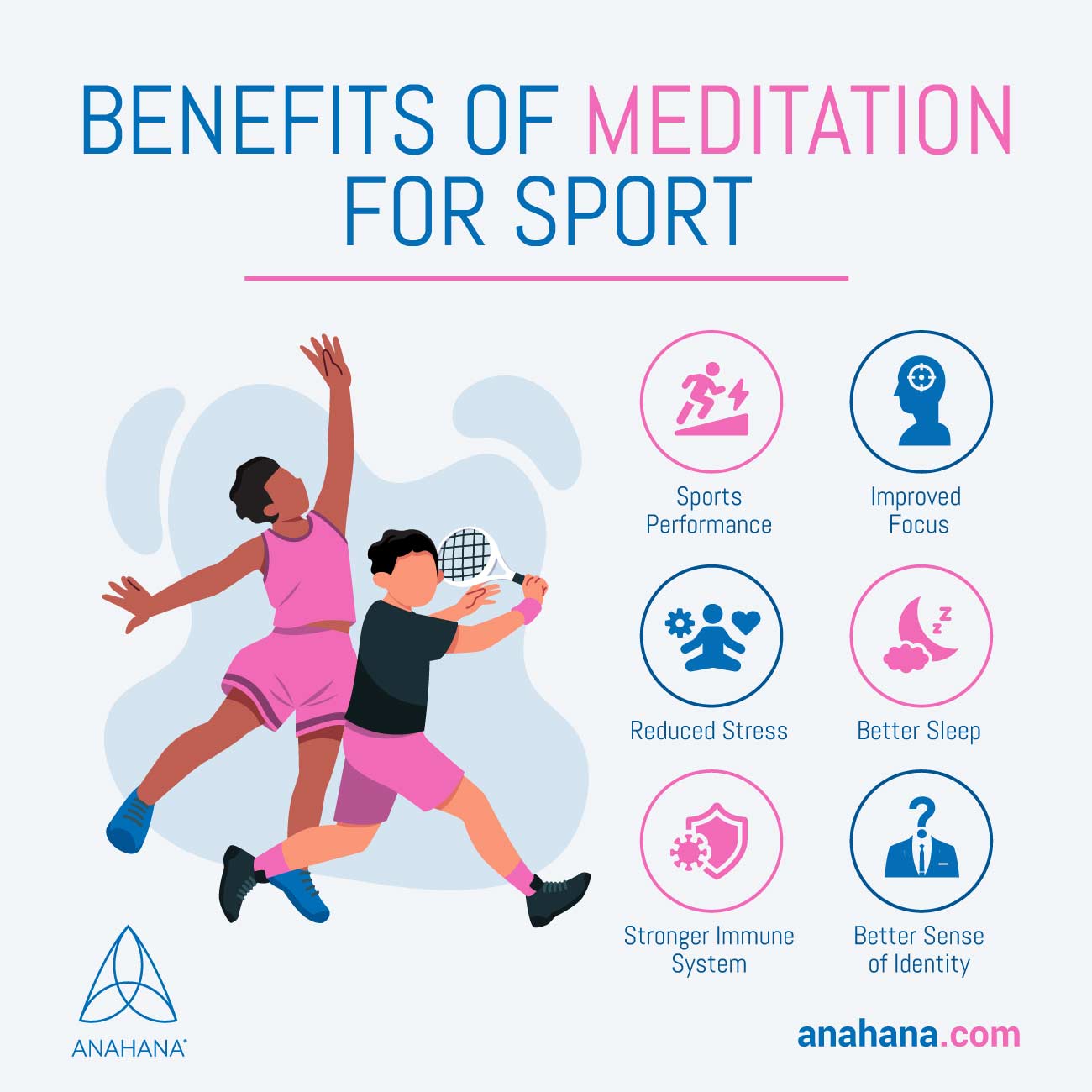7
Meditation For Sport
Last Updated: December 15, 2024

Table of Contents
Meditation is a powerful tool for athletes to harness in training and competition. Its benefits include enhanced performance, better focus, quicker recovery, and increased resiliency.
Meditation for Sport
In sports, we always look for ways to increase athletic performance, improve tactical awareness, speed up recovery, and improve our mental game and confidence. We tend to focus on more traditional methods, like training more, lifting weights, mobility work, and improving nutrition. All of which play a key role in successful training programming.
Yet we often overlook mindset and the benefits of mental training. Meditation is one of the most powerful tools when training a mindset that has many positive psychological, neurological, physiological, health and physical performance outcomes.
How Does Meditation for Sports Work?
Meditation helps athletes tune out external distractions and focus clearly on their physical activity. It works by getting into a relaxed state and clearing the mind of any racing thoughts. As a result, the athlete can better concentrate and stay in the moment.
And if you think that meditation will only work on the mind, think again. It can also improve muscle memory, allowing your body to execute movements with greater precision and speed.
Types of Meditation for Sports
When it comes down to meditation types, there is never one size fits all approach. Meditation is a very personal activity; therefore, it might take some time to find the practice that fits you.
Some are a more conscious practice, whereas others are more mental training, mindsets and perspective shifts that can be thought about as the day progresses. Combining many forms of meditation can help create a lasting and holistic approach that maximizes the benefits of meditation.
There is also no such thing as a perfect meditation; if your mind wanders at any point, recognize that and give yourself the grace to reset and continue. The more you practice, the easier it becomes to stay completely focused.
Mindfulness Meditation
Mindfulness meditation is a powerful tool to help athletes push their limits and achieve better sports performance. This practice involves intentionally focusing on the present moment, allowing one to observe their thoughts and surroundings without judgment. To practice mindfulness meditation, find a quiet space to sit comfortably and focus on your breath.
As you do this, let any thoughts come to you pass without judging or analyzing them. With continual practice, athletes can experience increased focus, better decision-making, and reduced stress levels. Athletes who practice mindful meditation can benefit greatly on and off the field, allowing them to perform their best in any situation in a state of mental clarity.
Visualization
Visualization meditation is a powerful tool that can help athletes push themselves further than they ever thought possible. This type of meditation involves picturing a specific event or achievement in great detail, imagining every facet of the experience until it feels tangible.
By rehearsing success in the mind, athletes can improve their sports performance, hone their abilities, and increase their focus in competition.
Body-scan Meditation
Body-scan meditation is a mindfulness practice that can enhance an athlete's physical and mental performance. It involves lying down or sitting comfortably and paying attention to your breath as you gradually scan your body from toe to head.
Body-scan meditation can be practiced for as little as five minutes or as long as 30 minutes and requires no special equipment. During the meditation, one focuses on making deep, intentional breaths and bringing their attention to each specific area of the body, one at a time.
Controlled Breathing
Mindful breathing, also known as controlled breathing, is a form of deep breathing meditation that can benefit athletes in numerous ways. Practicing breathing exercises and paying attention to each inhalation and exhalation can help athletes improve their focus, reduce stress, and enhance their overall performance.
To practice controlled breathing, find a quiet space to sit or lie down and begin by taking deep breaths in through your nose and out through your mouth. Focus on the sensation of each breath as it enters and exits your body.
With regular practice, you can cultivate a greater sense of mindfulness and control over your breathing, which can have positive effects not only on your athletic endeavors but in all areas of your life
Benefits of Meditation for Sport

Mental fitness is a key part of athletic performance. Researchers found that those who practice meditation through maintaining their attention and focus experience acute and long-term changes in physiology, anatomy and cognitive performance. Practicing meditation can play a significant role in increasing athletic performance and overall health and wellness.
Sports Performance
Meditation can help overall sports performance and physical training. Some athletes report meditation to enhance endurance through decreased perceived effort through proper breathing techniques, allowing them to train their attention efficiency. Hence, they are less focused on pain or negative feelings and emotions.
Research suggests that after athletes complete a time period of mindfulness meditation practices, their physical performance improves. Their racing times were lower etc.
Many athletes would describe a peak performance as one where they could get into and sustain a “flow state easily.” Flow state is where the athlete feels in sync with their body and the stimuli they are reacting to.
It is a state where the athlete feels like they are on autopilot. There are few to no negative thoughts, their perceived effort in the present moment is not great, and they experience an almost out-of-body sensation.
Improved Focus
You can increase focus and improve task-focused attention through mindfulness meditation. It allows athletes to train mental resilience by allowing them to realize they are not their thoughts and that their thoughts are not their reality.
Meditation allows athletes to be aware of thoughts, fears, and emotions without creating attachments. Meditation also helps athletes learn how to stabilize their emotions when they feel a negative emotion coming up.
Specific mindfulness techniques can help shift them from negative emotions, allowing them to focus on the present more easily.
Confidence, sense of control, and consistency in performance have all been shown to improve after meditation practice.
Great coaches, such as all-time winning NBA coach Phil Jackson, have practiced mindfulness meditation and mental training through the help of sports psychologists like George Mumford to build mental strength in his teams.
Reduced Stress
An athlete’s ability to manage physical, mental or emotional stressors is a game changer in training and performance. Mindfulness training and meditation can reduce stress levels, improve mental health and clarity, and process negative thoughts.
Meditation has physiological effects on stress; it lowers the stress hormone cortisol. Consistent meditation practice trains the body to relax in stressful situations. Hence, regulating emotions, adapting to positive or negative stimuli, and remaining calm under pressure becomes more effortless, allowing the athlete to train and perform relaxed and with a positive mindset.
Better Sleep
Mindfulness meditation can also increase energy, which is essential to great athletic performance. Energy can be gained from nutrition, breathing, sleep, and meditation. Meditation has the power to combat fatigue and brings energy even when sleeping quality and quantity are lower.
Sleep is necessary for the body to recover from training, and meditation can help aid in faster recovery from training and competition. Researchers have found that during meditation practice, there is an increase in neural coordination and a slowing of neural firing across many brain regions.
This is a similar process to nonREM sleep, which means that meditation may reduce the homeostatic pressures of sleep needs and benefit sleep architecture. Meditation may have the ability to overcome poor sleep quantity and quality.
Meditation also shares neurophysiological similarities with sleep, which positively improves attentional and cognitive performance, play into mental training and focus and reduces the stress mentioned earlier.
Stronger Immune System
New research shows that mindfulness meditation has the physiological benefits of strengthening the immune system, reducing blood pressure, reducing overall physiological strain and mental workload on human bodily functions, and enhancing cognitive function.
Better Sense of Identity
Mindfulness training and meditation can improve an athlete’s mind-body connection, self-awareness, and sense of self. Meditation requires a person to reflect inwards, focus unbiasedly, release different feelings and emotions, and focus on necessary bodily functions such as conscious breathing. These factors help improve an athlete's sense of identity, self and body.
When to Meditate in Training and Competition
Many recreational and professional athletes can benefit from meditation and perform better.
During Performance Anxiety
Athletes experience nerves and training or competition anxiety. Sports meditation can help calm nerves. Mindfulness during sports allows an athlete to decrease anxiety and be present.
When anxiety arises and thoughts creep up, shift and focus on conscious breathing; visualization, repeating affirmations, or many other techniques can help reduce anxiety and calm nerves.
Before a Practice or During Warm Up
Mindfulness meditation can be included in a pre-game or pre-competition routine to prepare the body and mind for what it's about to do.
Many athletes already have a well-laid-out routine. Calming music, conscious breathing, guided meditation, movement meditation, mantras, or affirmations can be a small addition to the existing routine.
One that reaps many benefits physiologically and psychologically and allows a person to prepare the mind, help them focus on the positive, have a better attitude and adapt more easily during practice or competition.
During a Performance or Practice
Mindfulness meditation can help one stay focused and regain some control when you are performing, and things aren’t going well.
Focusing on meditation, conscious breaths, repeating affirmations and mantras, visualization and other techniques can help to focus on the present and notice unwanted emotions and feelings that arise and release them.
How to Start Meditating As An Athlete
Meditation should be easy to add to existing routines and practices. Think about these steps when deciding when and how to implement the practice.
Reflect on Purpose and Motivation
Reflect on goals and how you want to perform or feel. Maybe you want to feel more in control of your mind when competing, or you’re stressed and not sleeping well.
Choose the Method
Next, based on the purpose and why, reflect on which method would most benefit you and your needs.
Set Reminders
When implementing a new practice into a routine that hasn’t become a habit, think about setting a reminder. This could be on a phone or a physical reminder, such as a sticky note on the mirror. Tying these reminders to existing tasks can also improve efficacy.
Start Small
Don’t try to do too much all at once. Allow yourself to start small and gradually increase over time. This will help implement meditation into routines without feeling overwhelmed if it is too hard or doesn’t come as easily as anticipated.
Practice
Athletes know that the more you practice something, the better you become at it. The more you practice meditation, the easier it will become. Consistency is key to making meditation a tool you consciously reach for when experiencing the negative emotions or anxieties of being an athlete or making it easier to adhere to a routine.
Don’t be afraid to try different types of meditation, implement a few depending on the purpose or goal, or change if one type is not serving you. The most important thing is to stay consistent and practice.
References
Meditation for Athletes — How to Start, Benefits, Types of Meditation | BarBend
Meditation for Athletes Improves Sports Performance
4 Types of Meditation for Athletes
OBM Integrative and Complementary Medicine | Meditation, Sleep, and Performance
What Is Meditation? Proposing an Empirically Derived Classification System
Developing Mental Toughness with Mental Training and Meditation
Developing Mental Toughness with Mental Training and Meditation
Meditation improves the immune system, research shows
Disclaimer
The contents of this article are provided for informational purposes only. Anahana does not provide medical advice, diagnosis, or treatment and should not be used as a substitute for medical advice from a healthcare professional. Anahana encourages consulting a qualified healthcare professional for medical guidance. Anahana is not liable for any errors, omissions, or consequences that may occur from using the information provided.

Dr. Darlene Buan-Basit is a highly experienced licensed Chiropractor and Pilates instructor with expertise in many techniques, including Medical Acupuncture, Traditional Chinese Medicine, and Advanced Massage Techniques.
